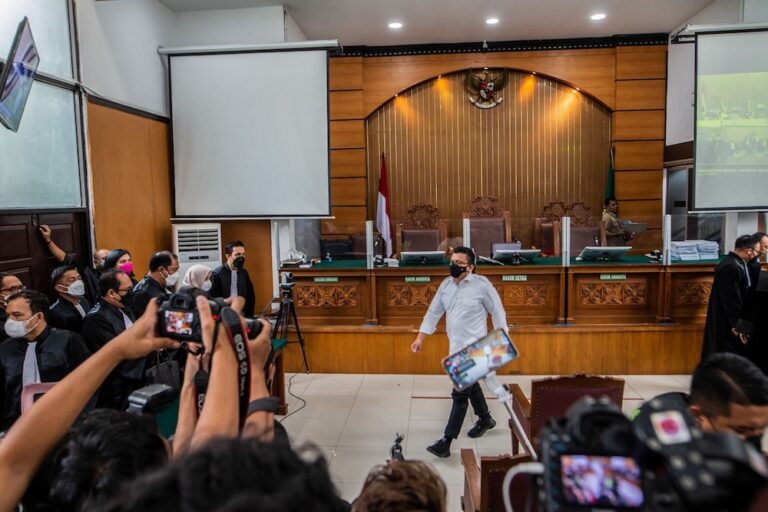(AJI/IFEX) – The following is an abridged version of a 3 January 2007 AJI press release: Year-End Note of the Alliance of Independent Journalists (AJI) 2006 Situation of Press Freedom in Indonesia Stop Violence against Journalists, Stop Criminalization against Press! The essence of press freedom and freedom to access information, as stipulated in Article 28 […]
(AJI/IFEX) – The following is an abridged version of a 3 January 2007 AJI press release:
Year-End Note of the Alliance of Independent Journalists (AJI)
2006 Situation of Press Freedom in Indonesia
Stop Violence against Journalists, Stop Criminalization against Press!
The essence of press freedom and freedom to access information, as stipulated in Article 28 of the Second Amendment of the 1945 Constitution, has not been fully realised. Various obstacles, threats and violence against the press and journalists occurred in 2006, in worrying levels of intensity.
According to AJI records, from January to December 2006, there were 53 cases of violence against journalists and the press in Indonesia. For the same period in 2005, AJI recorded 43 cases. The record of violence against the press this year has placed Indonesia 103rd out of 168 countries in the press freedom index of Reporters Without Borders (RSF), a France-based organization that protects journalists.
Jakarta was the least safe place for press and journalists, with 16 cases of violence. Other dangerous places were East Java (seven cases) and West Java (six cases). The modes of violence varied from physical abuse to harassment. Physical abuse was the most common, with 28 cases recorded, followed by lawsuits against the press, totalling seven.
As regards perpetrators, mobs number the highest (15 cases), followed by the government and police apparatus (seven cases each). This record of perpetrators of violence against press needs to be noted, as the culture of violence has shifted from the New Order-inherited state apparatus to mobs (ordinary people). AJI condemns violent acts by any party and expresses concern that some of the perpetrators were members of the government and police apparatus, who should have set a good example by solving problems in civilized ways.
As of early 2007, three cases of murdered journalists still have not been clearly solved; namely, the case of Fuad Muhammad Syafruddin (Udin), a journalist with “Bernas” daily in Yogyakarta (16 August, 1996); the case of Elyudin Telaumbanua, a journalist with “Berita Sore” daily in Medan, who was kidnapped (24 August 2005); and the case of Herliyanto, a freelance journalist in Probolinggo, East Java (29 April 2006). These three murder cases cast the same shadow as the murder of activist Munir and other cases of human rights violations in the past.
Another serious threat comes from the draft bill of the Criminal Code (R-KUHP), currently being deliberated by the House of Representatives (DPR) and the government. In the new R-KUHP, there are 61 crucial articles that are potentially harmful to political or civil freedoms, including press freedom. In comparison, in the current KUHP, there are still 37 crucial articles that can send journalists to prison. AJI has consistently said that if a journalist commits a criminal act (blackmail, fraud, robbery, etc.), punish him or her, but don’t send a journalist to jail for a report he or she writes.
As of today, there are still four criminal cases against the press undergoing trial proceedings; namely, the case of Supratman (executive editor of “Rakyat Merdeka” daily) for insulting the president; Risang Bima Wijaya (editor-in-chief of Radar Yogya) for defamation; Teguh Santosa (executive editor of “Rakyat Merdeka Online”) for insulting a religion; and Karim Paputungan (editor-in-chief of “Rakyat Merdeka” daily) for defamation. In the era of democracy, criminalising journalism and using the Criminal Code against the press should not occur.
AJI has also recorded that there are two draft bills (RUU) whose deliberations have been postponed by the DPR; namely, the draft bill on Protection for Witnesses and the draft bill on Freedom to Access Public Information (KMIP). In AJI’s view, both RUUs will speed up the process of democratisation and just law enforcement in Indonesia.
In particular, AJI has recorded several significant threats to the press in 2006, such as murder, court trials and attempts to arbitrary dismiss journalists. AJI regretted a dismissal, accompanied by physical abuse (by the media’s security officers) committed by a national media company that was previously well known for its anti-violence and democratic views.
With this release, the Alliance of Independent Journalists (AJI) Indonesia:
– Demands that the Indonesian government and all state apparatuses guarantee the safety of journalists and ensure press freedom.
– Urges the National Police to fully complete investigations into the murders of journalists and other violent cases immediately, and bring the perpetrators to justice.
– Asks the Indonesian government and the DPR to fulfil their commitment to democracy and law enforcement by not creating legal measures that are not in line with the spirit of democracy or respectful of human rights and political or civil freedoms.
– Urges media companies in Indonesia to respect the basic rights of press workers, to respect the freedom to organise trade unions and to avoid violence in solving problems.
– Calls on all, including members of the public, who feel maligned by press reports to take recourse to the mechanism of ”the right to respond”, already provided for by the Law Number 40 Year 1999 on the Press, and regard the Press Council as ”a court for media.”
Jakarta, January 3, 2007
President
Heru Hendratmoko
Coordinator of the Advocacy Division
Eko Maryadi


